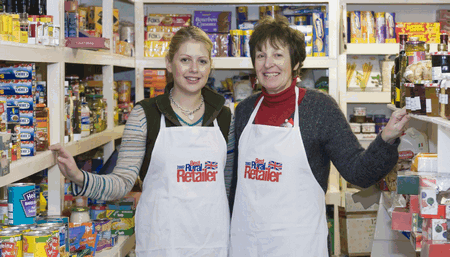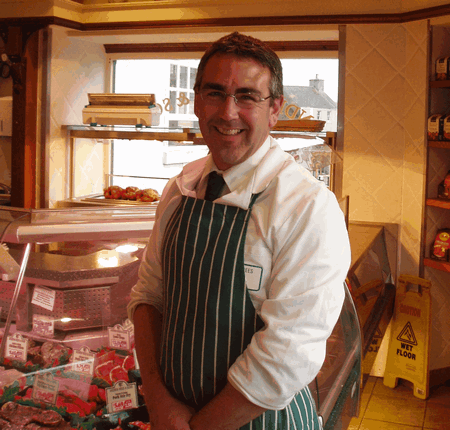Winners of ‘Best Rural Retailer’ contest announced

It’s been a hotly contested battle but the winners of the Best Rural Retailer Competition were announced this week.
A collaboration between farmers in Norfolk, a Wiltshire post office and store, a Surrey pub-cum-food emporium and a Pembrokeshire butchers have taken the honours in a prestigious national competition.
The Best Retailer Competition 2007, organised by the Countryside Alliance, supports rural communities by highlighting the achievements of a group of often-unsung heroes: retailers.
The event, now in its third year and supported by Farmers Weekly and The Daily Telegraph, attracted 2500 nominations from across England, Scotland and Wales.
After the nominations, the impassioned pleas by supporters and multiple judging rounds (including visits), the winners were announced at a high-profile presentation this week at the House of Lords in London, involving competitors, their families, MPs and other VIPs.

Best Village Shop/Post Office
Nettleton Post Office and Stores, Chippenham, Wiltshire.
Di Bell started the shop 30 years ago in one of the rooms in her house since which time she has made herself indispensable to the local community, especially since the closure of the local school and pubs.
She supplies a wide range of essential goods and services – everything from food and plants to hardware and pet food.
Films for processing, clothes for dry cleaning and shoes for repairing can all be dropped off and collected within the same week. The room above the shop even serves as a salon with a beautician available in the mornings and a hairdresser in the afternoons.
Di runs an interest-free credit book that enables customers to pay once a month and offers a free cash-back service. Customers can phone through orders, which she boxes for collection. To those unable to collect she offers a free delivery service. Similarly, people who work late are able to collect their goods from a “box” outside the door.
The post office Di installed is open 23 hours a week. The extended hours mean there is an afternoon postal collection – invaluable to local businesses, and ordinary customers alike. The threat of closure hangs over them, but they have vowed not to go without a fight.
The store acts as a polling station for elections, and is part of the neighbourhood watch scheme. They advertise, promote and sell tickets for fundraising events for local schools and church, alongside giving raffle prizes. They have a busy noticeboard, advertising everything from goods for sale, to cleaning/gardening services – all for a donation in a charity box.
Di is a member of the Parish Council and is always on hand to offer support and often mediates in local misunderstandings. Her sense of community extends beyond the locals and a warm welcome is experienced by all, from ramblers and their dogs to cycling groups.

As one of the regional judges commented: “Di Bell is a very special lady who has inspired particular devotion in her customers. She received dozens of nominations from people of all ages, all praising her warm nature and the fact that she is a lifeline who always goes above and beyond the call of duty. Many of Di’s customers said that the village would change for the worse without her.”
Best Diversification
Jolly Farmers Food Emporium, Betchworth, Surrey
Paula and Jon Briscoe took over The Jolly Farmers pub in 2005 and turned it into a rural pub-cum-restaurant-cum-deli-cum-farmshop.
The unique element of this diversification was the removal of the “drinking area” and the introduction of the integrated deli and shop feature, focusing on showcasing the best local and regional produce.
The local produce is featured on both the menu and within the shop, giving customers a brand new food and drink offer and the opportunity to make purchases outside of the “normal” times of most businesses as the shop remains open until 11pm every day.
The restaurant solves the largest problem faced by many smaller delis and farm shops by being able to deal with the shorter shelf life on many products – they can be incorporated on the daily specials and sold via the restaurant, minimising waste.
The food products and services are purchased from smaller local independents wherever possible and Jon and Paul reckon that in the two years since opening they have over 100 suppliers and have contributed in excess of £500,000 back into the
local economy as a result of their commitment to local purchasing policy.
The business plays a key part in the local community they provide lunches for local shooting parties, support local schools and charities they sell locally made provisions.
Paula and Jon have a passion for local and seasonal products, and a love of finding unique products.
“Paula and John have transformed a dark, mundane pub into a clean, smart operation consisting of a pub, restaurant and farm-shop/deli,” commented one of the regional judges. “Because the restaurant uses the same local foods (all explained on the menu) the shop is always alive with fresh local products.”

Andrew Rees, Andrew Rees Butchers, Narberth, Pembrokeshire
Andrew Rees became a butcher at 17.
He is passionate about local produce and is proud to sell meat and other products of superb quality in his traditional shop that are sourced so close to where he lives and works.
At 23 he purchased his shop, built the business up and began supplying catering establishments. The catering side now supplies over 150 local pubs, restaurants, hotels and tourist attractions throughout Pembrokeshire and West Carmarthenshire.
The retail shop was refurbished in 1999, and in 2006 a £300,000 extension and refurbishment took place, creating a traditional shop with state-of-the-art facilities.
Most of the produce Andrew sells is sourced locally – this includes all meats such as Welsh Black Beef, produced five miles from his business. All eggs are purchased from local suppliers, as are a selection of sauces and condiments.
He is the only fishmonger in Narberth and buys fresh fish from the local dockyard and he also has local fishermen from whom he buys mackerel, sea bass and trout.
Andrew produces a number of items in the shop including sausages, faggots, cooked meats and speciality meats, such as stuffed chicken breasts.
In-store blackboards advertise local meat and poultry and Andrew displays the passports, which accompany the meat so that customers can see the traceability. Andrew has also been awarded the Pembrokeshire Produce Mark – in recognition of the support he gives to locally-produced goods.
The business has sponsored numerous local schools with raffle prizes, sponsorship of sports team kits and academic competitions. They also sponsor the kit of Narberth RFC junior rugby team and support the adult team. As a business they have sponsored many local charity events. Andrew also undertakes outside catering and gives his time free and only charges for the basic cost of the produce if the event is for charity.
His catering manager lectures at the local college and also provides practical placements for catering and butchery students, ensuring these traditional skills will not be lost.
Andrew is a Trustee of The Bus Stop – a local youth drop-in centre. His family are also active in the community both Andrew and his wife are leaders in the local Young Farmers Club, which both of their children attend.
One of he regional judges commented: “As well as a commitment to supporting the local farming community, Andrew and his team are at the heart of Narberth life. Andrew has never forgotten the support that the people of Pembrokeshire have given to me. It’s a wonder he has time to run his exceptional butcher shop.”
Horstead Farming Group, Beeston St Andrew, Norfolk
Horstead Farming Group Ltd (HFG) is made up of five family farms in the heart of Broadland, working co-operatively.
Together they farm 3500 acres and are involved in providing contract services on a further 1500 acres. They offer various farming services.
They are passionate about the food they produce, source and sell through their Norfolk farms shops.
The shops help maintain more traditional farming methods revolving around the use of organic manures, straw mulches and good rotational practice. The use of modern techniques is at a much lower level than that used in large scale production. In this way they feel that they are maintaining food safety, without impacting on quality – growing safe, accountable food.
The variety of produce is staggering: Beef, pork, lamb, chicken, venison, Norfolk crabs, fruit and veg, honey, pies and quiches, fruit juices, home-made meringues, yoghurts, cream, eggs (including double-yoked ones), farmhouse ice-cream and locally produced gluten-free products.
HFG are Farmers Weekly “Food Miles Heroes” for their commitment to reducing food miles and having maximum traceability. The ethos is “we are helping to sustain the beautiful Norfolk landscape by having the right people farming it – looking after the wildlife and working the land – skills and knowledge built up over many years and generations. The environment, working with the community and education are all extremely important to us.”
Many group visits take place at HFG each year. One of the five farms is opened up to a local school for one day each year to coincide with Open Farm Sunday.
The regional judge said: “The main shop is located within a mile-and-a-half of Norwich itself. It is totally accessible to the town being set on a main road and a similar distance to the town centre as the supermarkets. They are passionate about the vegetables they grow. They have a reliable and enthusiastic group of suppliers all of whom are local. But what sets them apart is the desire to teach people where their food comes from, how it is grown and produced, and the fact that there is a link between welfare, high standards and buying British.”
Feel strongly about farmshops and other rural retail outlets? If so, we’ve created a special area for you on Farmers Weekly’s website to talk to each other. You can swap best practice, express your views and pick each others’ brain. To take part, go to the rural retailing part of FWiSpace. |
Five facts
- Five large retail chains account for 80% of food sold in the UK
- Between 1995 and 2005, nearly 30,000 independent food, beverage and tobacco retailers closed
- Post Offices provide local employment, as sub-postmasters who employ staff provide jobs for an average of 4.6 people.
- Research shows that 50% of turnover from local retailers is returned to the local economy. Large retailers may return as little as 5% to the local economy
- 8 out of 10 local residents are inconvenienced when their village post office closes. On third are affected a great deal, particularly those with no transport, people with mobility problems, older people and the less well off.
Source: Countryside Alliance
